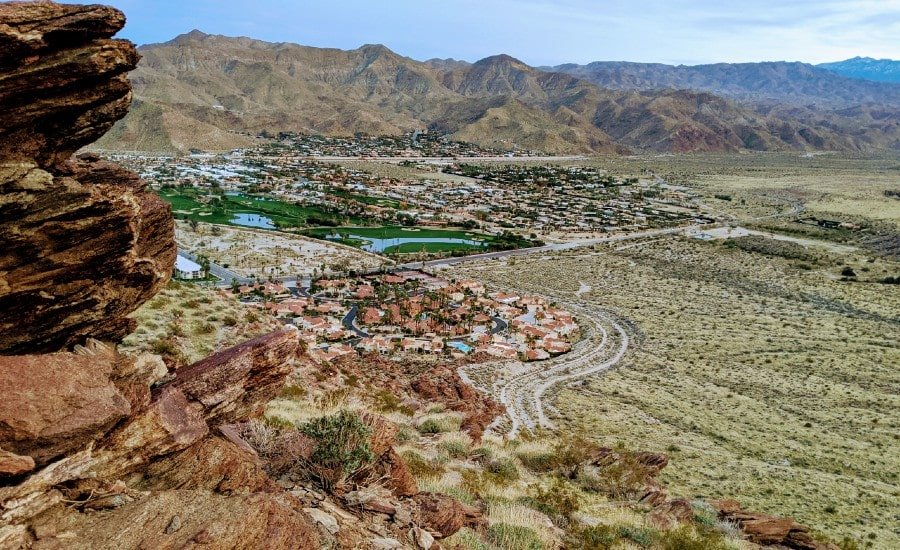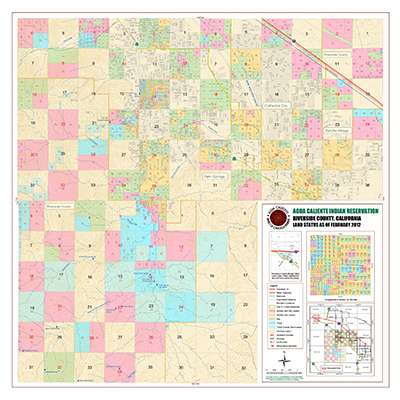
OK, it’s not really invisible.
 But it is a map that won’t show up on Google Maps or your nav system. And it is a map you’re going to want to refer to when you’re looking for Palm Springs real estate.
But it is a map that won’t show up on Google Maps or your nav system. And it is a map you’re going to want to refer to when you’re looking for Palm Springs real estate.
We’re talking about a map that indicates where the fee simple and lease land is in the city of Palm Springs and the surrounding area. People searching for homes to buy in Palm Springs may be unfamiliar with the concept, that is, the difference between fee simple (or just plain “fee”) and lease land because they come from someplace with only fee land.
And it’s confusing because fee land sounds like you have to pay a “fee.” But it’s lease land where you need to make a (usually) monthly payment, basically like rent, because you don’t own the land your home sits on; you lease it.
What is Lease Land & Fee Simple Land in Palm Springs?
In Palm Springs real estate ads, you’ll often see mentioned, “You own the land!” Meaning it fee simple land. Lease land in Palm Springs belongs to the native Agua Caliente Band of Cahuilla Indians, usually called the Agua Caliente Indians or Tribe.
So, what’s with the map?
Back when the Coachella Valley was initially surveyed, and a railway through it was planned, the federal government divided up the land into one-square-mile sections, deeding every other section to the local Indians. This made a neat checkerboard pattern on the Palm Springs region, with primarily even-numbered sections belonging to the Agua Caliente Indian Reservation.
This checkerboard pattern is obvious when you look at the reservation map. And it explains why when you drive around town, you’ll see an undeveloped desert where you’d expect to see housing or commercial buildings, like that which may exist right across the street. Or, at least, the pattern was obvious before Palm Springs grew.
The first sections to be developed, naturally, were the sections that were off the reservation. The Indians began developing their land by leasing it for business and residential purposes. Later on, families and individual Indian landowners sold their parcels outright, and those became fee-simple land. So, although you can guess what is fee land and what is lease land by known street boundaries, you can’t be sure without checking the map.
For example, most of section 24 is now fee simple land, but not all of it. Some of it, especially condo developments, are leased land. Section 14, in the commercial downtown area and central Palm Springs, is a notorious mess of tribal, lease, and fee. The tribal land is home to the Agua Caliente Casino and the under-construction Cultural Center. This section is a popular topic of discussion at city planning meetings.
Much of the residential lease land is devoted to condo developments, which makes sense considering that each unit pays a lease, and you can put a lot more units in a condo development than one made up of single-family homes. But again, some condos on lease land may be next door to condos on fee simple land, even though they’re in the same section. Some condo developments in central Palm Springs in section 14 and some in the Indian Canyons neighborhood south of downtown are like this.
What Happens When Land Leases Expire in Palm Springs?
What happens upon lease expiration is up to the Indian owners.
The Tribe’s preferred lease period was 65 years, and because many of those leases began in the 1970s and ‘80s, many are now within 30 years of expiring. That can present problems for lenders, who make loans with 30-year terms, but most leases are renewed long before the expiration date. Some are renewed for an interim period, an additional 30+ years, making the lending process more acceptable.
Some of section 24 was fee land several years ago. When the land lease was up, the family members who owned the land decided to sell. Homeowners in those properties, who had been paying a land lease, suddenly had to buy the land. The regular income generated from the leases for the Tribe does not make this a common or financially attractive practice.
When looking for real estate in Palm Springs, it’s a good idea to find out about the land lease terms. As a Realtor, I have that information and understand the ins and outs of buying lease land. Sometimes, a Zillow search (or other real estate apps) won’t give you all the information on land leases you should have. And usually, these apps do not filter by fee and lease land. Another reason why checking the map helps.
Is Fee Simple or Land Lease Better in Palm Springs?
What does it mean to a buyer of Palm Springs real estate when considering a property on lease land or fee land? The answer could take another article. Some say that buyers get more for their money when purchasing property on lease land, and in Palm Springs, that may make a difference, especially in the condo market. There are tax differences, resale and loan differences as well.
Given the unusual nature of Palm Springs real estate, it’s best to consult with a professional. That’s why I’m here. I keep abreast of the continuing saga of the lease land situation in Palm Springs; I know the players, and I can discover plans or intentions that won’t appear on a map.
Doing your own research
To find out the land type of an individual property or to search the online map of the Agua Caliente Indian Reservation, click here to go to the Agua Caliente Geospatial Information System. It’s the definitive resource on the topic.
Are you interested in learning more about the Palm Springs real estate market? Contact Geoffrey Moore online or by phone at (760) 641-5689 for more expert local information!
Posted by Geoffrey Moore on

Leave A Comment